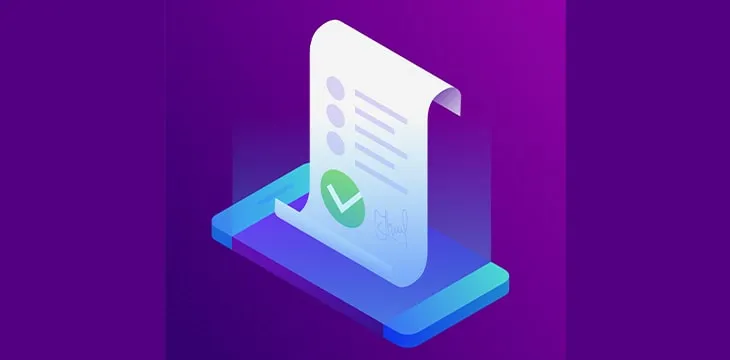|
Getting your Trinity Audio player ready...
|
Smart contracts are referred to across the BSV blockchain. Once in place, they automatically work as designed and are unchangeable and irreversible. The potential for smart contract use is almost limitless. As the smart contracts are stored on the immutable blockchain ledger, they can never become lost, fire damaged, or disappear. Once in place, they will be there forever.
What is a smart contract?
Smart contracts are pieces of code compiled into a program and stored on the blockchain. The program code contains rules and terms for the upcoming transaction. A smart contract program will execute (run) when certain conditions defined in the contract are met.
Smart contracts automatically run when two parties are connected to each other, for example, when buying and selling Bitcoin. Like an ATM machine, the cash you want will not actually be delivered into your hands unless the same amount has been debited from your bank account. Until both events have occurred, the transaction will not be complete.
A smart contract will ensure that the funds will not move to another party until the exchange rules have been met and the originator’s account has been debited. The smart contract works to ensure that all the rules contained in the contract have been fulfilled and the conditions have been satisfied. Once all conditions have been met, the blockchain will be updated with the new transaction.
The contract is verified by the blockchain and terms agreed by the two parties involved in the contract. There is no need to have a third-party intermediary involved to check that all parts of the contract are in order.
Whilst smart contracts are seen as an advantage in many scenarios. A smart contract must not contain any code errors that could be exploited at some time in the future.
Benefits of smart contacts
As smart contracts are stored on the blockchain, they run automatically without human intervention. This means that the contract itself can be verified and resolved quickly. Normal contracts require human intervention and checking by a lawyer or legal specialist who can verify that the terms in the contract are correct and valid, and the transaction exchange can go ahead.
Removal of the human team to check the contract also means that the contract fees are significantly reduced.
As the contracts are stored on copies of the blockchain on servers around the world, these smart contracts can be accessed by anyone who fulfills the predetermined conditions. The smart contract can instantly be invoked, processed, and the transaction validated almost instantly.
Use cases for smart contracts
There are many potential use cases for smart contracts, from the simplest financial transaction to complex ones:
Voting systems. Code can be written for electronic voting to ensure that one person can register only one vote. Online voting would increase the percentage of voters casting their vote and provide a secure method to eliminate fraud.
Counterfeiting systems. Smart contracts could confirm the digital authenticity of an object—for example, a piece of art. Every time the piece of art changes hands, its authenticity will only be guaranteed if it is accompanied by the transfer of the digital token to the new owner.
Clinical records. Only the nominated medical personnel who have been given explicit permission by you to see your blockchain-based medical records will be able to do so. The smart contract will ensure that the terms of the smart contract will accept only the people you want to have access to.
Human resources. Confidential records about your employment can be securely stored by the employer and accessed by the employee. The system can be trusted as the data can not be modified after it has been placed on-chain. If the employer breaks the terms of the contract, the smart contract will still exist.
Banking. Your money will never disappear if the bank makes an error. As the blockchain is copied to every node in the network, your information remains safe.
NFTs. Non-fungible tokens are digital entities stored on the blockchain. They use smart contracts between the seller and the buyer to exchange these items of digital value and pass them on to the new owner. Digital receipts can also accompany items of value—such as luxury branded fashion goods, to show their authenticity to the purchaser.
Many more applications could benefit from using smart contracts instead of traditional electronic or paper-based contracts. Developers building smart contracts must make sure that there are no errors in the smart contract that could be exploited—such as the DAO hack in 2016, which caused a reversal of the transaction and a splitting of the Ethereum blockchain.
But a well-crafted smart contract permanently stored on the blockchain will continue to do its work without human intervention for as long as it is needed. And that could potentially be many, many years.
Watch: The BSV Global Blockchain Convention presentation, Smart Contracts and Computation on BSV
https://www.youtube.com/watch?v=c_zAlkImgTU

 07-15-2025
07-15-2025 





